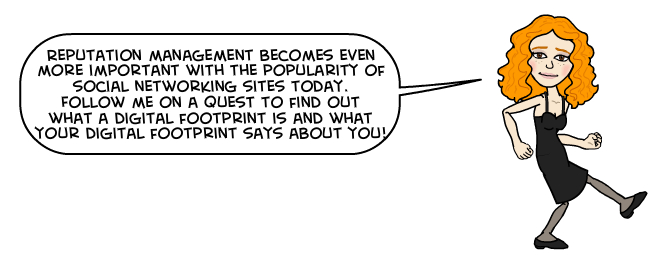Introduction

Everytime we get online and everywhere we go on the Internet we leave our mark, a trace, a digital footprint. As we use or move through electronic environments, we leave collectable traces that make up our digital footprint. Everything we do online is accumulated into a digital dossier that is traceable by others. Some is content we actively volunteer—like our Facebook profiles. Other material is passive, such as the cookies a Website stores in our browser, the content our district collects about our use of their equipment, etc. All this data can be aggregated to build a profile of each and every one of us and our behavior. Did you know that your digital footprint starts before you are even born? How aware are you of your digital dossier? Watch the following video, which is a timeline of Andy's lifespan, to find out.
"On the Internet a digital footprint is the word used to describe the trail, traces or "footprints" that people leave online. This is information transmitted online, such as forum registration, e-mails and attachments, uploading videos or digital images and any other form of transmission of information — all of which leaves traces of personal information about yourself available to others online." (Webopedia, 2013)
"Today’s children, youth and young adults are tomorrow’s adults, professionals and educators. Unlike those of us who came of age prior to the rise of social networking, many of these least stellar moments will be captured, shared and forever archived online—thereby affecting their opportunities and future. In fact, statistics indicate that our students’ digital footprints are starting younger and going deeper than ever before." (Hengstler, 2011)
"Reputations—and images—are fragile things that are easily maimed and difficult to restore. The fragility of image and reputation, combined with the ability to replicate and transmit messages—both good and ill—along networks, as well as the rise of powerful search engines and identity aggregators, means that Web 2.0 and social networking can have substantial impacts on the survival of businesses, organizations and individuals." (Hengstler, 2011)

